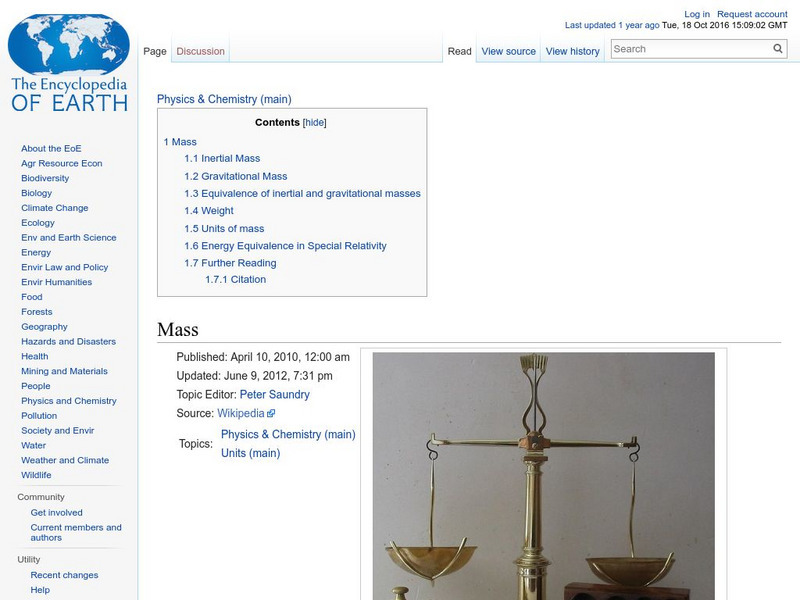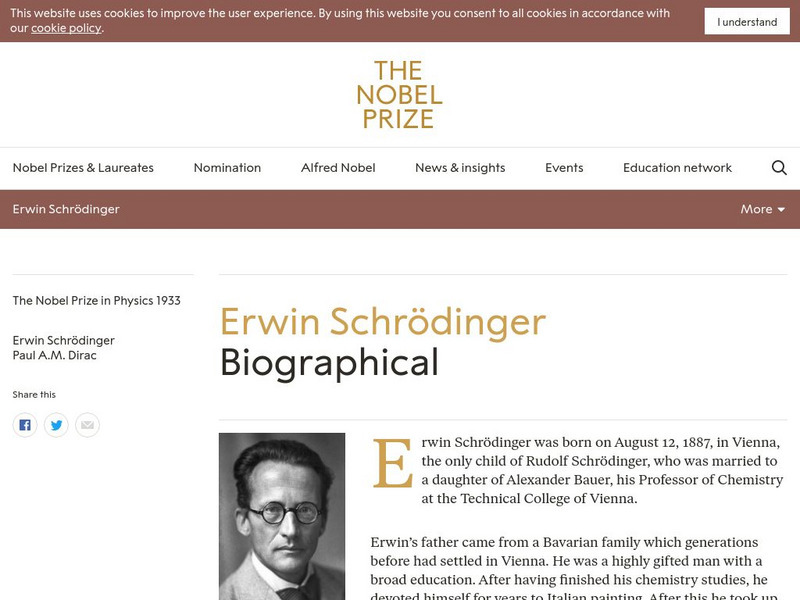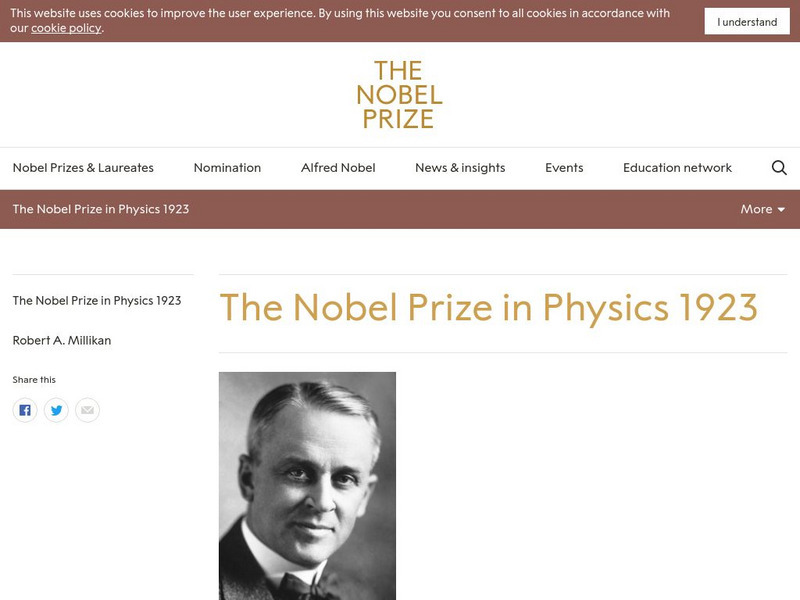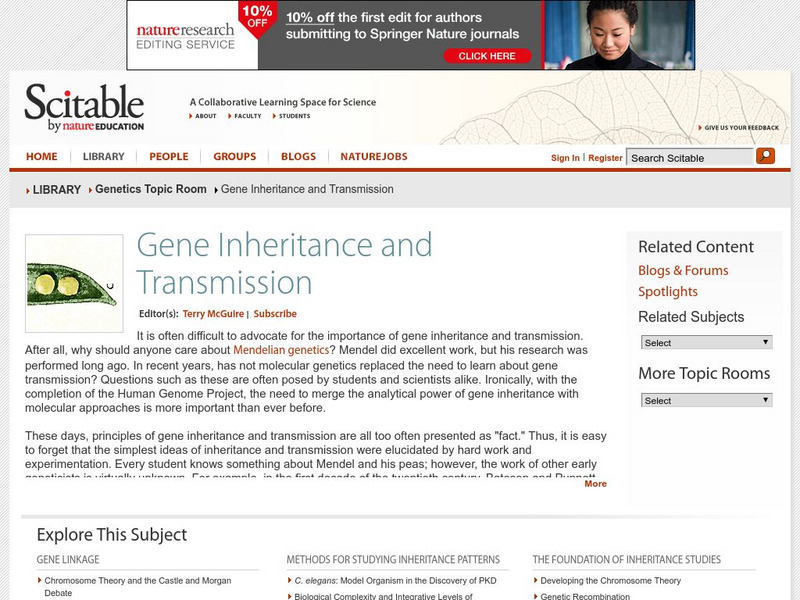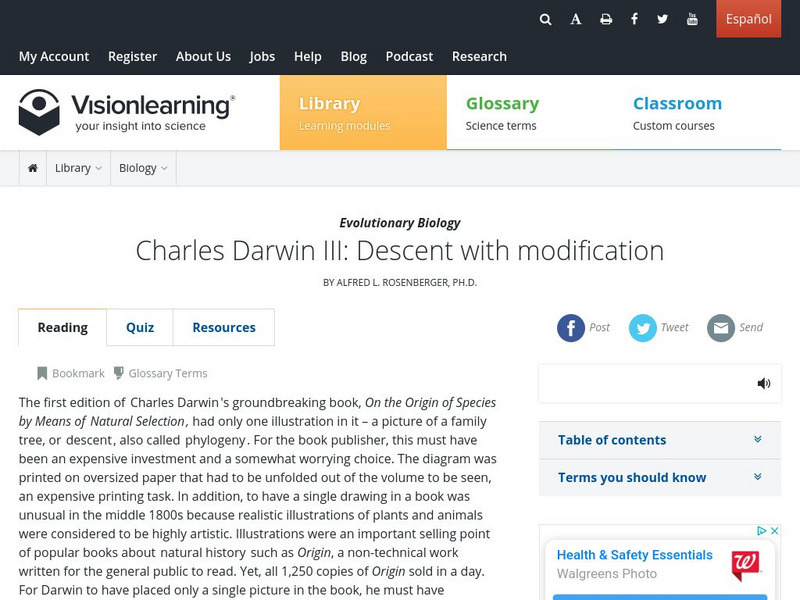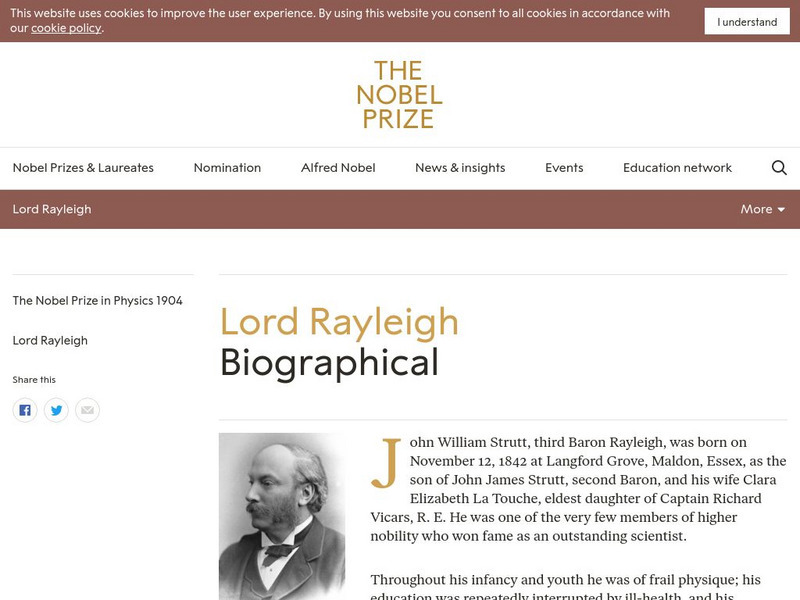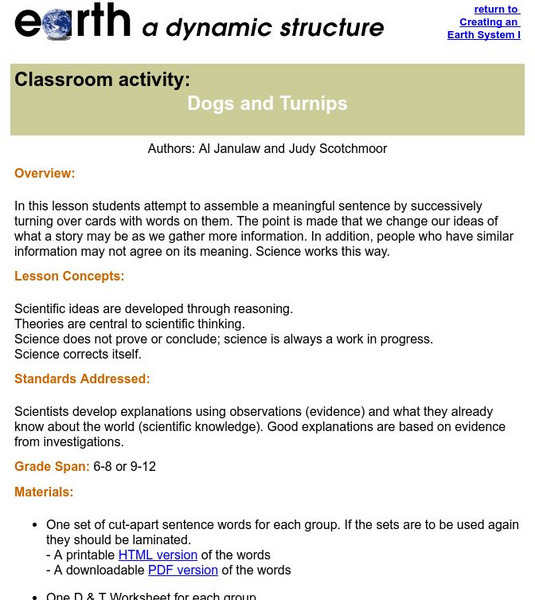Hi, what do you want to do?
Story Behind the Science
Story Behind the Science: Alfred Russel Wallace [Pdf]
A detailed biography of Alfred Russel Wallace, known especially for his theoretical work on evolution, which was published prior to Charles Darwin's own theory. Questions are posed throughout about the nature of scientific research.
Encyclopedia of Earth
Encyclopedia of Earth: Physics & Chemistry: Mass
Defines inertial and gravitational mass, their scientific history, formulas used in their calculation, the definition of weight, units used for mass, and mass as perceived in the theory of special relativity.
Nobel Media AB
The Nobel Prize: Erwin Schrodinger Biographical
This biography from the The Nobel Foundation overviews the life and scientific worlk of Erwin Schrodinger, an Austrian scientist who was honored for his work with atomic theory. Read about his education and personal life, and view links...
University of St. Andrews (UK)
University of St. Andrews: Niels Henrik David Bohr
This resource presents a biography of Bohr, including many personal tidbits, as well as a substantial treatment of his scientific work. Several interesting quotes by and about Bohr are included. It also links to several other sources.
Story Behind the Science
Story Behind the Science: Pendulum Motion, Time, and Shape of Earth [Pdf]
Article outlining the scientific history behind the evolution of theories about measuring time based on the movement of a pendulum, and about how gravity would impact a pendulum's movement depending on one's proximity to the Earth's...
Nobel Media AB
The Nobel Prize: The Nobel Prize in Physics 1923: Robert Andrews Millikan
This Nobel website on the life and scientific work of Robert A. Millikan includes a biography, images, and internet resources for further reading and research. Also included are the 1923 "Presentation Speech" which praised Millikan's...
Nature Research
Scitable: Gene Inheritance and Transmission
Get an in-depth look at gene inheritance and transmission with this webpage. This site explores genetics beyond Mendel and his peas. Investigate transmission genetics with the following topics gene linkage, variation in gene expression,...
British Library
British Library: Discovering Literature: Romantics & Victorians Technology
The 19th century saw a rapid technological change, together with paradigm shifts in scientific understanding. These articles research how authors responded to the new possibilities afforded by technology and science.
University of California
Q Files: Misconceptions About Science
Many students have misconceptions about what science is and how it works. This module explains and corrects some of the most common misconceptions that students are likely having trouble with.
Other
Blackwell Publishing: Evolution: Adaptive Explanation
These pages are part of a site called Evolution that accompany a textbook by the same name. Mark Ridley is the author. There is a large amount of information available about adaptations and their role in evolution.
Nobel Media AB
The Nobel Prize: J. J. Thomson Biographical
Read this detailed Nobel E-Museum biography which includes information on the scientific world of Joseph John Thomson, which gained world-wide recognition and earned Thomson the Nobel Prize in Physics.
Vision Learning
Visionlearning: Biology: Charles Darwin Iii: Descent With Modification
Instructional module focusing on Charles Darwin's theory of Descent with Modification. Discusses how slight changes from parent to offspring create variation and potentially create new species over time. Site also includes an interactive...
Open Curriculum
Open Curriculum: Evidence for Evolution
With this article, students will be able to clarify the significance of a scientific theory and recognize that Darwin supported his theory with a great deal of evidence, and that many kinds of evidence since his time have further...
Other
Univ. Of California Riverside: What Is Occham's Razor?
This tutorial explores what Occham's Razor is and how this philosophical adage can be applied to scientific theories and hypotheses.
University of California
Understanding Evolution: An Introduction to Evolution
A textbook definition along with an explanation of the scientific theory of evolution.
Columbia University
Columbia University: Columbia University & Slavery Post 1865: Faculty and Admin
After the Civil War concluded in 1865 and the Thirteenth Amendment abolished slavery, Columbia University's faculty members shaped historical interpretations of slavery, the Civil War, and Reconstruction, as well as scientific theories...
PBS
Pbs: A Science Odyssey
Website for the PBS series "A Science Odyssey." Numerous opportunities to explore the people and discoveries of science.
Texas A&M University
Peer Curricula: Story Time: Thomas H. Huxley
A biography of the remarkable life of Thomas Huxley, who began his life in abject poverty, but through self-education and dedication, became a star in world science.
Wikimedia
Wikipedia: Albert Einstein
In this Spanish-language entry, grasp a concrete understanding of a complicated man whose discoveries impacted society more than any other scientist. This site chronicles the life and accomplishments of Albert Einstein. It also studies...
Nobel Media AB
The Nobel Prize: Lord Rayleigh Biographical
At this site from the Nobel e-Museum, you can read about the scientific work of Lord Rayleigh (1842-1919 CE). This article includes information on his education and experiments with light and sound waves.
NASA
Nasa: Space Place: What Is Science?
Students learn abut scientific investigation and the difference between hypotheses and theories.
Other
American Institute of Physics: Ideas of Cosmology: Big Bang or Steady State?
Find out about the Steady State Theory of the origin of the universe. Learn about the scientific thinking and historical findings supporting this theory which states that new matter is continuously being created.
Louisiana Department of Education
Louisiana Doe: Louisiana Believes: English Language Arts: Grade 5: The Making of a Scientist
Fifth graders learn about the steps of scientific investigation. Students explore how various theories have changed over time by gaining knowledge through scientific investigation. They will begin to use evidence and read about peoples'...
University of California
Ucmp: Understanding Science: Dogs and Turnips
A simple lesson plan where each group of students turns over word cards creating sentences from them. As the student turns over more cards, the group modifies the meaning of the sentence, leading them to discuss how scientists change...





![Story Behind the Science: Alfred Russel Wallace [Pdf] Article Story Behind the Science: Alfred Russel Wallace [Pdf] Article](https://static.lp.lexp.cloud/images/attachment_defaults/resource/large/FPO-knovation.png)
